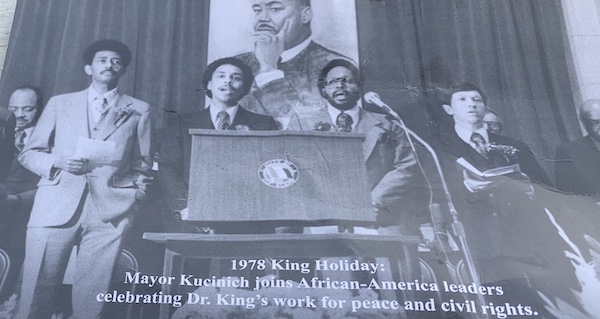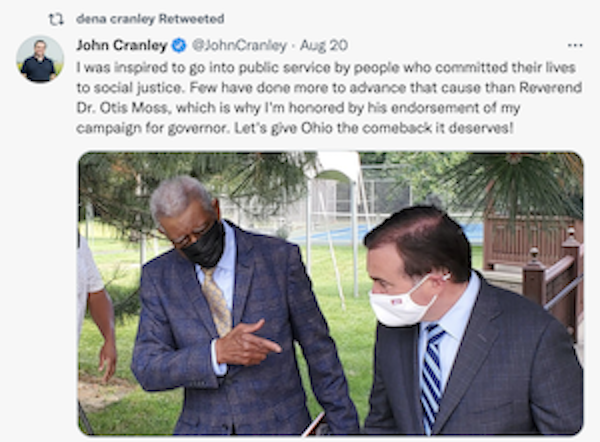Kucinich using old tricks in effort to win black voters; will they go for it? Are voters ready to pass baton to new generation?
Dennis Kucinich is running for mayor again, 42 years after having been turned out of the office after serving a single two-year term in which he survived a recall attempt by a miniscule 236 vote margin. Badly battered and bloodied, he was nonetheless able to resuscitate his political career, first as a state senator and eventually serving as a member of Congress for 16 years until he was gerrymandered out in 2012.
Can he become mayor again, achieving the vindication he so clearly seems to be seeking? He’s regularly been considered the front-runner, but he could easily be the underdog if he makes it through the primary. Nobody is confident at this stage who his opponent would be. A plausible case can be made for five of the six other candidates — former professional poker player, attorney, and quixotic politician Ross DiBello being the outlier.
The Kucinich brand was established in the 1970s at a time when politics in Cleveland was pretty much a racially-charged cage fight. Westside politicians often distributed campaign literature with different tints on either side of town.
While Cleveland politics is no longer as brutal as in the past, use of a racial calculus by both candidates and pundits remains strong in assessing any election for Cleveland mayor. A variety of factors — from newly-released census data to the increasingly depressed turnout by black voters, to the absence of an incumbent — contribute to the relevance of such a calculus.
The Kucinich brand was established in the 1970s at a time when politics in Cleveland was pretty much a racially-charged cage fight.
But perhaps the biggest reason race hovers over this election is the return of Kucinich to a city-wide ballot for the first time since 1979, in what is likely the most unpredictable mayoral primary in Cleveland history. And in some ways the Kucinich campaign is begging the question whether he’s using the divisive tactics of the past in his effort to return to City Hall.

East side campaign mailer from Dennis Kucinich campaign could not be bothered to identify the "African-America" [sic] leaders he stood near while mayor. Revs. E. T. Caviness and Otis Moss are at left. We are working to confirm identity of the two men between Rev. Moss and Kucinich. We understand the man in the dark suit at the lectern may be the actor Leon Isaac Kennedy.
In recent weeks the Kucinich campaign has sent mailers to east side voters and placed full page ads in the Call and Post. (The C&P was once a dynamic example of the power of the Black Press; today it is largely inconsequential, with virtually no local content and a greatly diminished readership.) The ads contain pictures of the Kucinich of old with revered and esteemed black leaders such as former mayor Carl Stokes and Dr. Otis B. Moss, pastor emeritus of Olivet Institutional Baptist Church. Perhaps only old-timers will even recognize Dr. Moss (and the nonagenarian Rev. E. T. Caviness in the background) since they are not identified by name.
To these eyes, which have observed Kucinich closely since 1975, the ads seem aimed at securing a credibility with black voters that he has never earned. [Full disclosure: I supported Kucinich in the years 1977-79, even sponsoring a Sunday dinner at the legendary Vel’s Red Carpet Lounge on Carnegie to introduce him to a segment of Cleveland’s middle class black community with which he was totally unfamiliar. About 80 people attended, as I recall. Behind that is a story for another day.]
Kucinich’s memoir, The Division of Light and Power, makes the dubious claim that half of his major cabinet appointments were black. The claim is akin to his references of being a transient eastsider during his formative years, staying just one knock ahead of the landlord. The implication is that of a connection to black voters via image and imagination, rather than by substance or fact.
The point here is that while Kucinich affects a keen relationship with the black community, that connection is essentially transactional. If that isn't clear, contrast the sincere in-the-moment endorsement that Moss gave Cincinnati mayor John Cranley last week with the decades-old photo of the un-named Moss standing in proximity to Kucinich.

Screen shot from Twitter account of Dena Cranley showing Dr. Otis Moss gesturing with Cincinnati mayor John Cranley
Which one seems like a genuine endorsement?
Campaigning on both sides of town
Preliminary 2020 census results may show slight incremental improvement at the margins in city and countywide racial integration, as a community we are by and large still in thrall to patterns now understood to have been intentionally set in place by federal policy in the 1930s and more or less enthusiastically maintained by real estate, financial and other interests ever since.
Looking over the mayoral field, there may be only a couple of the candidates are making concerted efforts on both sides of the Cuyahoga River, historically the symbolic fault line between east and west, black and white. First time office seeker Justin Bibb, with no beginning political base, has sought to make a virtue out of necessity. He started earliest, nearly two years ago, seeking support wherever he could find an audience. He seems to have found some resonance on both sides of town, particularly in parts of Wards 15 and 3, perhaps most notably among millennials, as well as among seniors who appreciate his fresh and earnest approach. Of course, his endorsement by former mayor Mike White may curdle some of that freshness.
City Council president Kevin Kelley has followed the more traditional path of an Establishment candidate, relying on endorsements from his council colleagues to deliver pluralities from their wards, augmenting his Ward 13 base. He of course long ago bagged the endorsement of Frank Jackson, even if it wasn’t made public until earlier this month. But endorsements mean little if the elected officials who make them are not motivated to engage their followers, or worse, have no real connection with their own constituents. How many votes will he garner from his Ward 2, 5 and 9 councilmanic endorsements?
Might voters favor change over status quo?
Race and geography may not be the only demographic factors to look at. What if the critical fault line of the electorate fell along neither color nor neighborhood lines? Could the crucial variable perhaps be generational, or perhaps more accurately, new vs. old?
There is a sense in which not much has changed politically in Cleveland since Mike White’s second term. Had Ray Pierce defeated Jane Campbell in 2001, after White’s third and final term, that would likely have wrought a substantial political overhaul. But Campbell beat him, only to lose to Jackson four years later. Campbell and Pierce both left town, and we seem to have settled into a political malaise reminiscent of mid-2oth century Cleveland. The sixteen year mayoral tenure of Frank Jackson seemed to coincide with a wet blanket being dropped over any nascent political energy — especially in the black community, a phenomenon only enhanced by former Congresswoman Marcia Fudge’s twelve-year Congressional run.
So it made sense when a sixtyish black man and longtime Glenville resident offered a biting assessment of the mayoral field. “I think all these old folks running should go sit down and make way for the youngsters. He seemed to divide the contestants between the old guard — former councilman Zack Reed, State Sen. Sandra Williams, Kelley, and Kucinich — and the fresher faces: Bibb and councilman Basheer Jones.
If that attitude has any sort of latent virality, then DiBello’s presence could even serve to siphon some votes away from Kucinich and Kelley.
Cleveland voters in the 11th Congressional District opted narrowly for change in the recent Democratic special primary, providing a plurality of the vote for Nina Turner. While it wasn’t enough to override the margins county councilwoman Shontel Brown piled up across the rest of the district, might it be a sign that Cleveland voters want some pizzazz with their policies?
• • •• • •
Updated August 31, 2021 at 10:30 with tentative photo identification of Leon Isaac Kennedy.


















